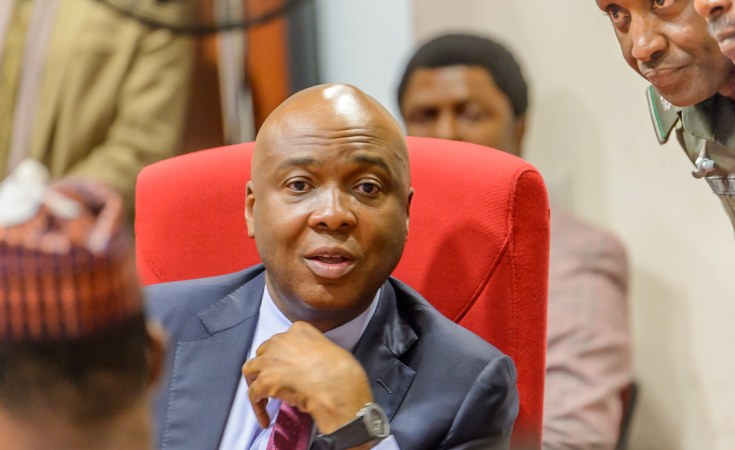Forward to the 8th Senate of the Federal Republic of Nigeria - 3-Year Report.
It has been three years since the inauguration of the 8th Senate. A period which has been marked by rising unemployment, oil price declines, economic instability and rising insecurity. Our nascent democracy has been and continues to be tested. As a country, we have a monumental task ahead of us, to stabilize the economy, create jobs and ensure our people have access to decent healthcare and education.
The Senate has an important role to play in achieving these objectives.
At inception the 8th Senate adopted the Senate Legislative agenda focusing on three broad areas: Improving Livelihoods, Improving Governance and Improving Business.
Over the last three years we have been focused on driving this agenda undertaking a comprehensive review of business- related legislations in Nigeria with a view to improving Nigeria's ease-of-doing-business ranking as well as improving the general operative environment for business in Nigeria, increasing access to funding for health care and education and building social safety nets for the most vulnerable in our society including those ravaged by war and conflict.
In the area of Improving Business we have focused our legislative reforms on reducing regulatory burdens for and easing access to capital for Micro, Small and Medium Enterprises.
We have been successful in getting the Secured Transactions in Movable Assets Act 2017 signed into law allowing small companies gain better access to credit using movable assets as security.
The Companies and Allied Matters Act has been amended by the Senate after 28 years with changes aimed at encouraging investment in small businesses, lowering costs and easing regulatory burdens. This Bill is presently making its way through the lower house.
We continue to work on the Federal Competition and Consumer Protection Bill to supervise and promote competition in the market to make for a more balanced development of our economy and to increase opportunities for Nigerian businesses.
We are hopeful that work on this bill will be completed before the expiration of the 8th Senate.
In pursuing our Improving Business agenda, we recognise that our underdeveloped transportation infrastructure is detrimental to the growth of Nigerian businesses and the economy. However, due to years of under investment the only way the country can raise the enormous amounts of capital required to fund infrastructure projects is through public-private partnerships.
To this end the Senate is advancing legislation that enables private sector participation and financing for the delivery of targeted high priority transportation projects. Railway infrastructure is one of such priorities and the Nigerian Railway Authorities Bill allows the participation of the private sector in investment in and management of railway infrastructure. In addition we have passed legislation that will enable investment in and improve our roads and ports.
High rates of poverty and income inequality are fueling insecurity and instability. A large number Nigerians live under US$2 a day. Through the Improving Livelihoods agenda, the Senate is working to raise standards of living, ensure that every Nigerian has access to basic healthcare and that every Nigerian child is educated at least to secondary school level thereby increasing opportunity.
The Nigerian Bureau of statistics has put the North East of Nigeria as having the worst socio-economic conditions in the country with the highest poverty and illiteracy rates in the country. The North East Development Commission established under the North East Development Commission Act 2017 will coordinate and harmonise all interventions and initiatives of the Federal Government in the North East and work with partners both local and international to develop the zone.
Nigeria's public health care system is under tremendous pressure serving a population of over 180 million people. Presently close to 70% of health care expenditure is out of pocket for households already straining to make ends meet and leaving very little for anything else. As of 2014 there were around 30,000 primary health facilities, and almost 4000 secondary health facilities serving our population, well under the WHO recommendation. There is an urgent need to increase funding for and access to primary healthcare and the Senate has set aside one per cent of the Consolidated Revenue Fund for the basic health care in the 2018 Appropriation Bill which has been signed into law.
The Universal Basic Education (UBE) programme in Nigeria was launched in 1999, with the goal of providing free, universal and compulsory basic education for every Nigerian child aged 6-15 years. This programme has failed to meet its objectives due to a number of reasons not least inadequate funding. With the amendment to the Act establishing the programme we have increased Federal Government funding for the programme. Our vision is to see 100% of our children under the age of 12 educated.
The 8th Senate will continue to pursue its legislative agenda, to reform the economy and build a country that creates opportunity for all. It is an honour to preside over this Senate. It is not a responsibility I take lightly and together we will work to build a country that all Nigerians both at home and abroad can be proud to call home.
Abubakar Bukola Saraki
Senate President, Federal Republic of Nigeria


